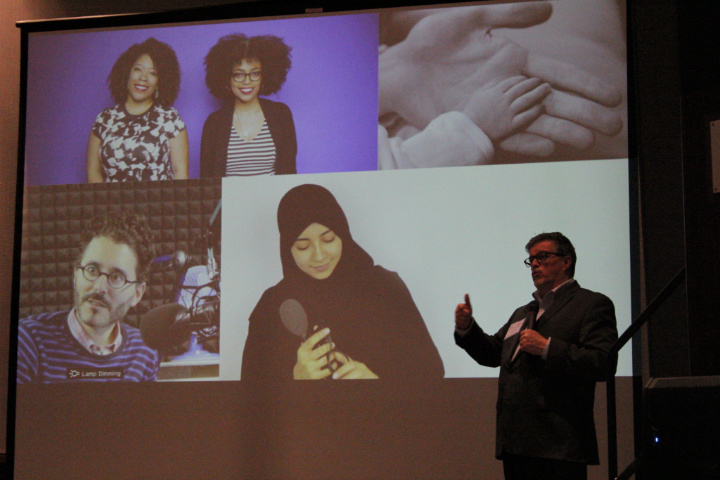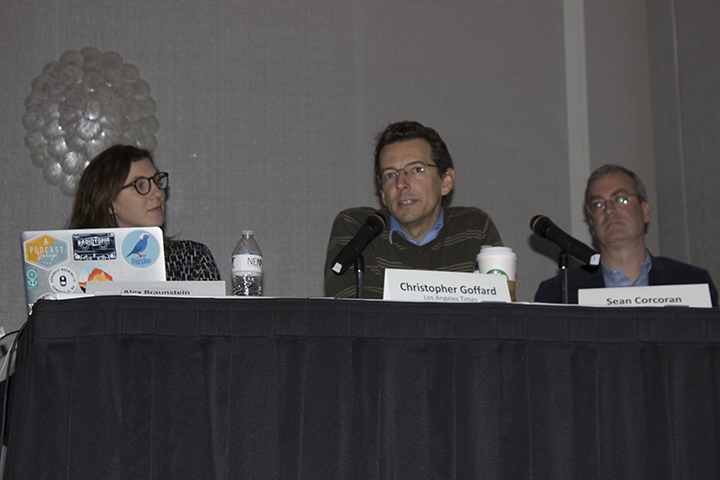
‘If you think you don’t have time to get something like podcasting done in your newsroom, then stop doing something else that no one cares about.’
— Al Getler,
Division sales manager,
Advantage Newspaper Consultants,
Burlington, Vt.
Podcasts can – and should –
enhance newspaper content
By Rebekah Patton
Bulletin Correspondent
In the push to expand storytelling beyond print, podcasting has become increasingly more popular, and small newspaper businesses struggle with allocating time and money toward it.
Christopher Goffard, a staff writer and podcast host at The Los Angeles Times; Sean Corcoran, news director and senior reporter at WCAI-FM of Woods Hole, Mass.; and Alex Braunstein, community manager of Podcast Garage of Allston, Mass., sat on a panel about introducing podcasting at newspaper companies. Al Getler, division sales manager at Advantage Newspaper Consultants in Burlington, Vt., and a former publisher, moderated the session.
More than 40 guests attended the session, titled “Podcasting 101: How to add it to your news strategy,” at the recent New England Newspaper and Press Association winter convention.
Getler initiated the discussion by answering the question: How can small newspaper companies afford to direct limited resources toward podcasting?
“Sometimes the bush has to be pruned for it to grow new branches,” Getler said.
He suggested a book, “Necessary Endings: The Employees, Businesses and Relationships That All of Us Have to Give up in Order to Move Forward” by Henry Cloud, that discusses the art of reducing some facets of businesses to grow others that are more promising.
Getler spoke directly to the editors in the audience: “If you think you don’t have time to get something like podcasting done in your newsroom, then stop doing something else that no one cares about.
“Put your resources towards something that people do care about,” he said.
Corcoran said he had been a newspaperman for years. He moved into audio after he used a cassette recorder to interview a victim after The Station nightclub fire in Warwick, R.I., in 2003 that killed 100 people and injured 230.
Corcoran said he was fine during the interview, but that when he returned to his office to transcribe the recording, he was overcome with emotion.
“The one thing I’ve always been really good at is writing, and I sat there and thought, ‘I cannot convey this to my audience the way it should be understood’,” he said.
After that, he ventured into the public radio business, and eventually arrived at his current job with WCAI.
‘We still need journalism; it should not be neglected. Podcasting should be supplementing the reporting, not supplanting it.’
— Christopher Goffard,
Staff writer, podcast host,
Los Angeles Times
Getler then steered the discussion into a question-and-answer format.
One reporter asked the panel how she could pitch her podcast idea to her editors to make it appealing, because she knew it would take a lot of time and resources.
Goffard answered: “Frame the story so that the editor understands why you need audio.”
He said the reporter should present an audio sample to her editors, and ask them how she could present it in any other medium with the same impact.
“There’s certain things that just don’t come through the same in writing,” Goffard said. “I’ve been trying for 20 years to write a description of people crying that is 1/1000th as powerful as watching somebody cry in front of you. With audio, you can do that.”
Another questioner asked: How do you obtain revenue from a podcast?
Braunstein recommended partnerships. She said Podcast Garage has sponsorships that generate revenue for a lot of podcasts, because sponsors are specifically interested in podcast audiences.
She said live shows are becoming a big source of revenue, from ads and sponsorships.
Someone else asked how a reporter should transition from writing for the page to writing for the ear.
Goffard noted that while he is a fan of long, pretty sentences, with dashes and clauses, he had to curb that style of writing for podcasting.
“The mind tends to wander when listening,” he said. “There’s only so much the ear can process.”
Corcoran suggested thinking about the rhythm of sentences. Reading out loud can help decide between a good or bad sentence for audio, he said.
“’Name, age, of town, state,’ might read well, but read aloud, it doesn’t sound well,” he said.
Goffard said he is not an advocate of supplanting nuts and bolts journalism with podcasting.
“We still need journalism; it should not be neglected,” he said. “Podcasting should be supplementing the reporting, not supplanting it.”
The session took place Saturday, Feb. 24, in the Renaissance Boston Waterfront Hotel in South Boston.

‘There’s certain things that just don’t come through the same in writing. I’ve been trying for 20 years to write a description of people crying that is 1/1000th as powerful as watching somebody cry in front of you. With audio, you can do that.’
Christopher Goffard
